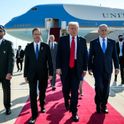Leaving the European Union will see the UK assume responsibility for the management of trade policy and trade agreements for the first time in over 40 years. Brexiteers have argued that this is the prize that awaits us. Others have argued thatit is no more than a consolation prize for withdrawing from the world’s largest free trade area.
Trade policy can be a tool for changeand progress. Trade agreements shouldseek to elevate protections and standards. Labour’s trade policy will ensure that workers’ rights are protected and will prevent our producers being undercut by cheaper imports manufactured to lower health, animal welfare or environmental standards. If taking back trade competence is to be anything more than a consolation prize,we must restore faith in the global trading system by addressing these challenges and ensuring that the benefits of trade are more equally shared whilst mitigating the damage inflicted on our environment. At a minimum, we must maintain the status quo and start from a level footing. That is why Labour have called for a new customs union with theEU that ensures that British and European businesses can continue to trade with each other without the imposition of tariffs.
The stability of the rules-based system that has underpinned international relations and world trade is under serious challenge. The US-China trade war, the WTO’s inability to appoint to the appellate body and the US’s threat to withdrawfrom the WTO altogether along with its increasing protectionism are all seriously undermining the multilateral rules based order. Brexit is part of all this. After yearsof globalisation, disaffected populations have lost confidence that the system is fair. Greater competition has seen the relocation of jobs and the closure of businesses from developed countries like the UK. However many in the global south are paid poverty wages as their countries’ raw materials are exploited and their nascent manufacturing capacity stunted by the enforced liberalisation of their domestic markets under trade access agreements that were supposed to be in their interest.
All the while increased global freight movements compound climate change and add to carbon emissions. Surging demand for goods means manufacturers need more energy, more water and more raw materials extracted from our finite resources. And as forests are destroyed and seas polluted, it is once again the poorest in the world who suffer because it is the natural environment that provides 50 per cent of the GDP for those living on under $2 a day.
“Our export successes have been predicated upon the high standards and high standing of British-made brands overseas”
Yet this is so foolish. Our export successes have been predicated upon the high standards and high standing of British- made brands overseas. People in China and India buy British goods not because they are cheap, but because they trust they are of high quality. Lowering standards threatens that and allowing a flood of imports produced to lesser standards will only undercut our own producers.
Our steel and ceramics sectors havefelt this particularly keenly—competing with goods dumped below cost price on British markets. Other governments have introduced tough trade defence measures to level the playing field for their domestic producers and to protect jobs at home. Repeated Conservative governments have actively resisted European modernisation efforts and will erode them furtherwhen the Trade Remedies Authority is established—described as the weakest trade defence regime in the world. Labour’s proposed customs union with the EU would preserve the existing safeguards that are in place.
Making the most of global trade opportunities does not mean transitioning to a low-tax, deregulatory, “Bargain Basement” economy. It means developing a robust Industrial Strategy intertwined with a strong trade agenda. We need to broaden our export base and ensure that trade growth benefits all the nations and regions of the United Kingdom whilst continuing to attract investment into those regions. It means giving our domestic producers a chance to compete on afair basis. Our efforts to ensure that the Trade Remedies Authority is fit for purpose were rejected outright at every turn bythe Conservatives.
It is why some Conservativecabinet members and their right-wing backbenchers have so vehemently opposed Labour’s proposal. They know that it is a workable solution which would preserve rights and protections, jobs and the economy. They want to remove those rights and protections and unilaterally remove tariffs. A Labour government would negotiate a customs union and a trade agreement that ensures our hard- won workplace protections are not eroded and that the spirit of the Good Friday Agreement is respected as customs checkpoints on the Northern Ireland border would not be required.
“Making the most of global trade opportunities does not mean transitioning to a low-tax, ‘Bargain Basement’ economy”
Labour would ring-fence Tradeshow Access Programme funds to support British exporters getting in front of customers overseas and would develop UK Export Finance’s offer to attract a broader mix of industry sectors and projects, moving away from a focus on arms sales and support for fossil fuels.
Whatever happens in the coming weeks, we are presented with a unique opportunity for Britain to take a pivotal role on the world stage and to be a leader in next generation trade agreements that boost trade and tackle the significant, if not existential, challenges that face us. We absolutely must get it right.
Read more from the global Britain report













